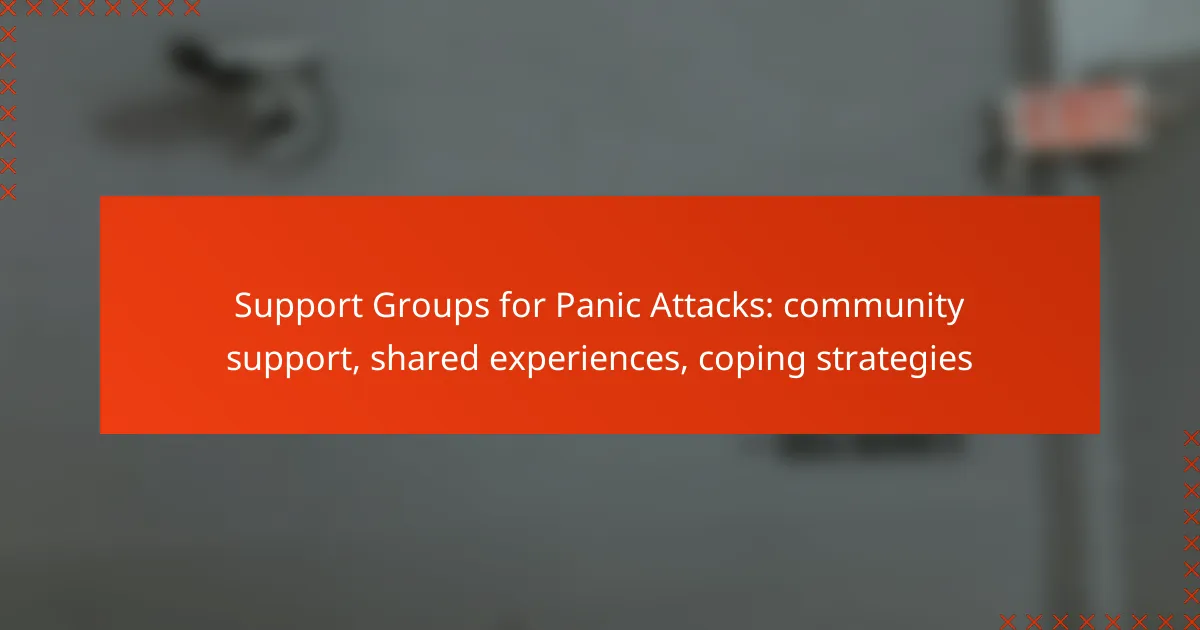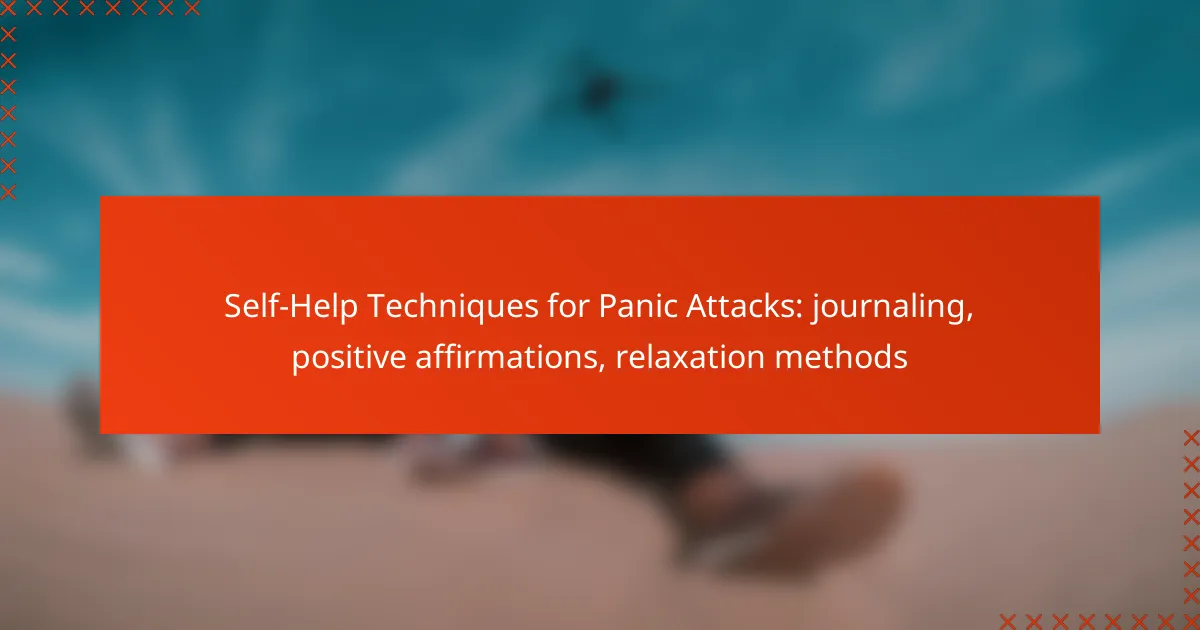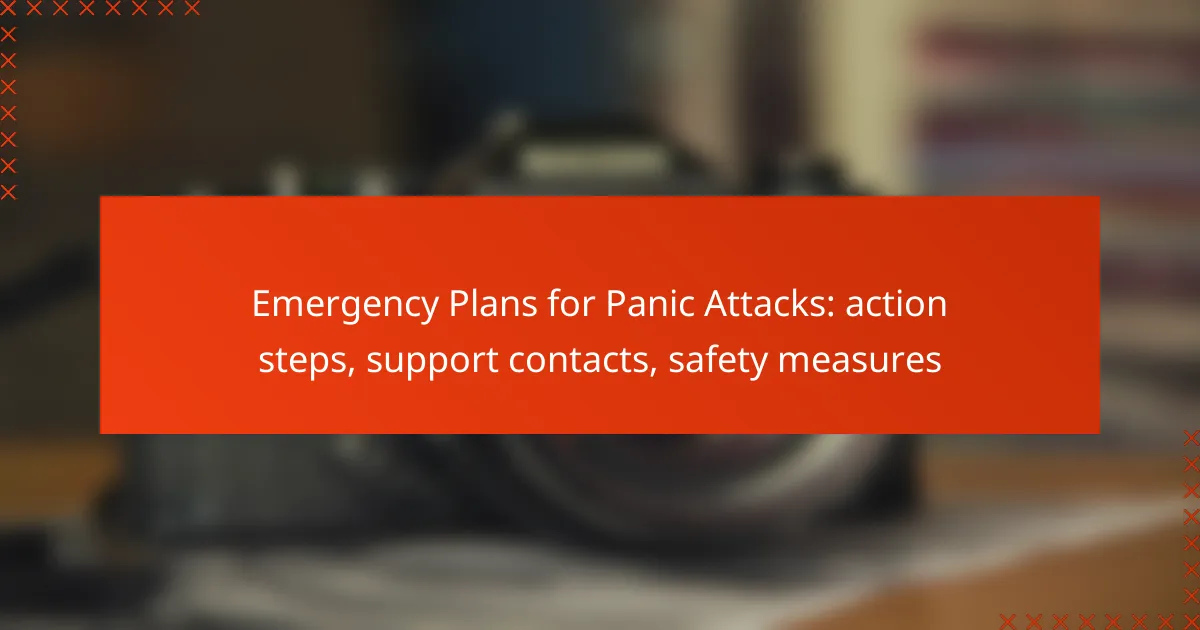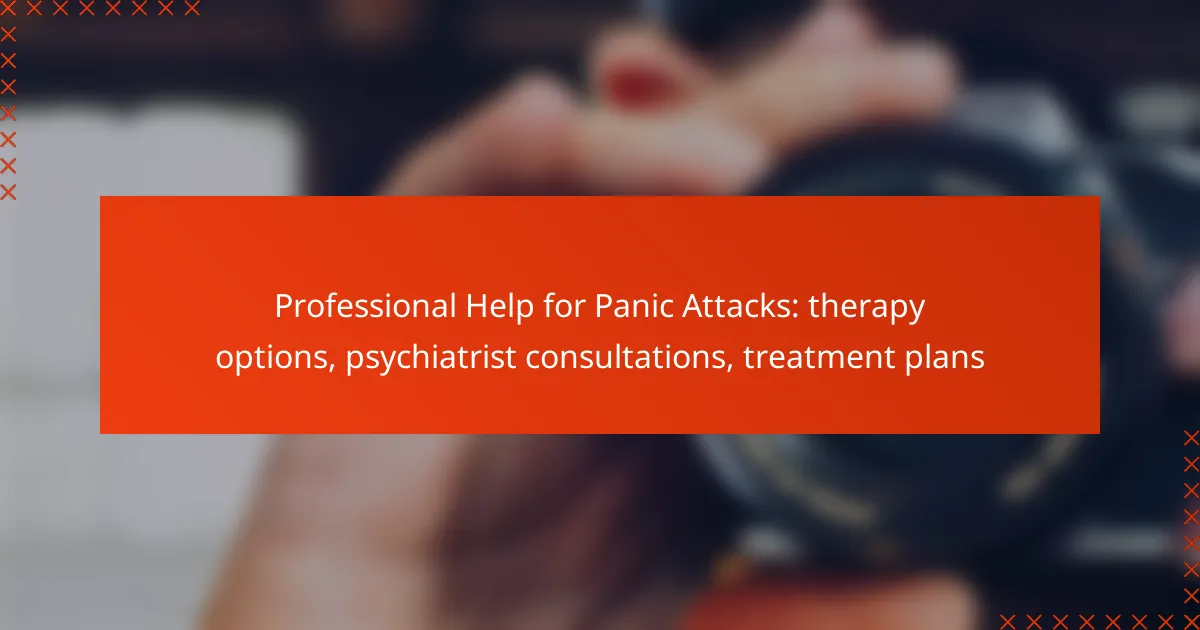Support groups for panic attacks provide a vital resource for individuals seeking community support and shared experiences. By fostering an environment of understanding, these groups empower members to manage their anxiety more effectively through the exchange of coping strategies and practical techniques. Connecting with others who face similar challenges can alleviate feelings of isolation and promote a sense of belonging.
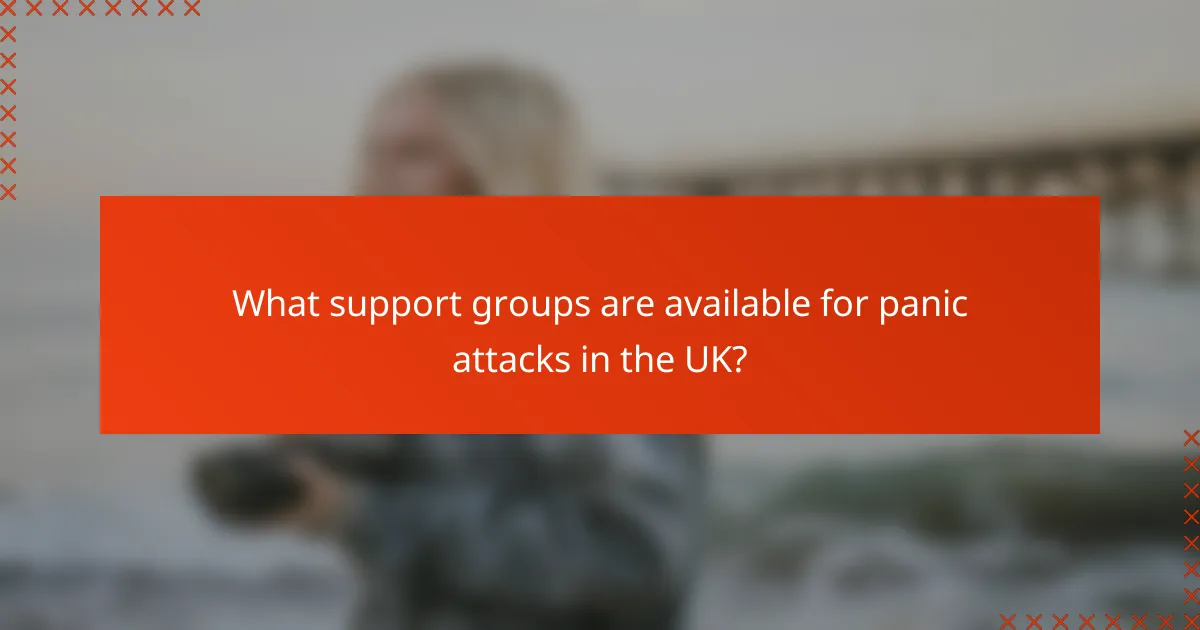
What support groups are available for panic attacks in the UK?
In the UK, various support groups for panic attacks offer community support, shared experiences, and coping strategies. These groups can help individuals manage their anxiety through connection and understanding.
National Health Service (NHS) support groups
The NHS provides a range of support groups specifically for individuals experiencing panic attacks. These groups are often facilitated by trained professionals and can include both in-person and online options.
To find a local NHS support group, visit the NHS website or contact your GP for recommendations. Participation is typically free, making it an accessible option for many.
Mind charity support networks
Mind, a leading mental health charity in the UK, offers various support networks for those dealing with panic attacks. Their services include peer support groups, online forums, and resources to help individuals cope with anxiety.
Mind’s support groups often focus on shared experiences, allowing participants to connect with others who understand their challenges. You can find more information on their website, where they list local branches and available resources.
Local community centers
Many local community centers across the UK host support groups for individuals experiencing panic attacks. These groups may be run by volunteers or mental health professionals and can provide a safe space for sharing experiences and coping strategies.
Check with your local community center for scheduled meetings or workshops focused on anxiety management. These groups often have low or no fees, making them a practical choice for community support.
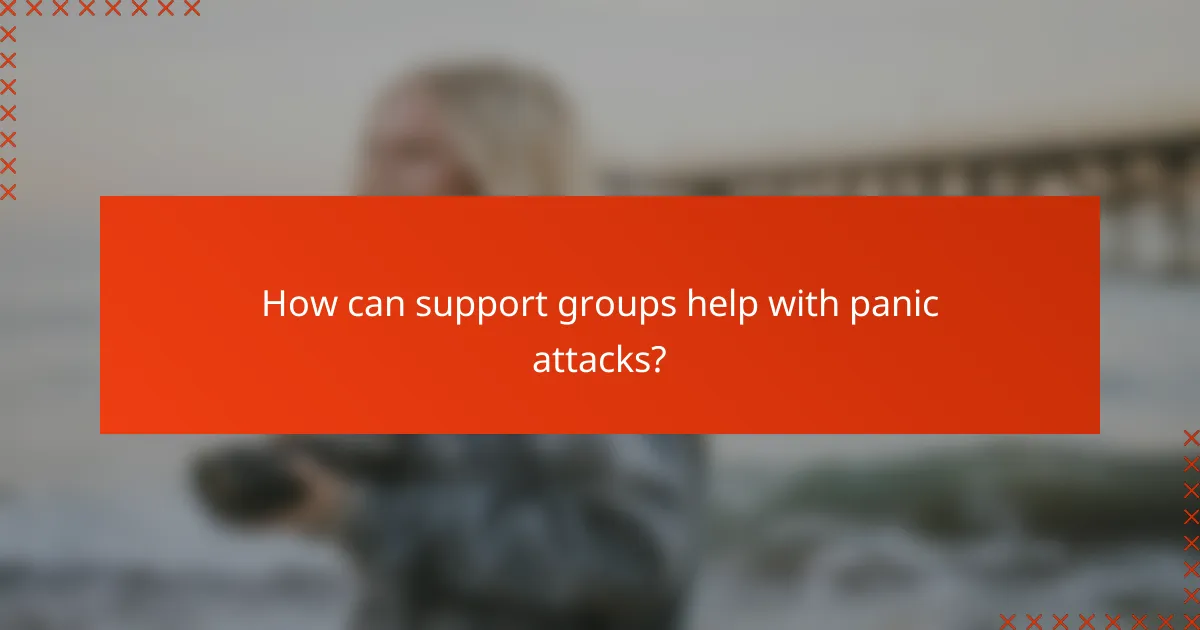
How can support groups help with panic attacks?
Support groups can significantly aid individuals experiencing panic attacks by providing a safe space for sharing experiences and coping strategies. These groups foster community support, which can alleviate feelings of isolation and empower members to manage their symptoms more effectively.
Emotional support from peers
Emotional support from peers in a support group can be invaluable for those dealing with panic attacks. Members often share similar experiences, creating a sense of understanding and validation that can be comforting. This shared empathy can help reduce feelings of loneliness and anxiety.
Participating in discussions allows individuals to express their fears and concerns openly, which can lead to emotional relief. Knowing that others face similar challenges can also encourage members to feel more hopeful about managing their panic attacks.
Shared coping strategies
Support groups provide a platform for exchanging effective coping strategies among members. Participants often share techniques that have worked for them, such as deep breathing exercises, mindfulness practices, or grounding techniques. These strategies can be tailored to fit individual needs and preferences.
Members can also discuss what hasn’t worked for them, helping others avoid common pitfalls. This collaborative approach fosters a sense of teamwork and mutual support, making it easier to implement new strategies in daily life.
Access to mental health resources
Support groups often serve as a gateway to valuable mental health resources. Many groups are facilitated by mental health professionals who can provide insights into treatment options, such as therapy or medication. They can also recommend local therapists or clinics that specialize in anxiety disorders.
Additionally, group members may share information about workshops, books, or online resources that have helped them. This collective knowledge can empower individuals to seek further help and enhance their coping toolkit for managing panic attacks.
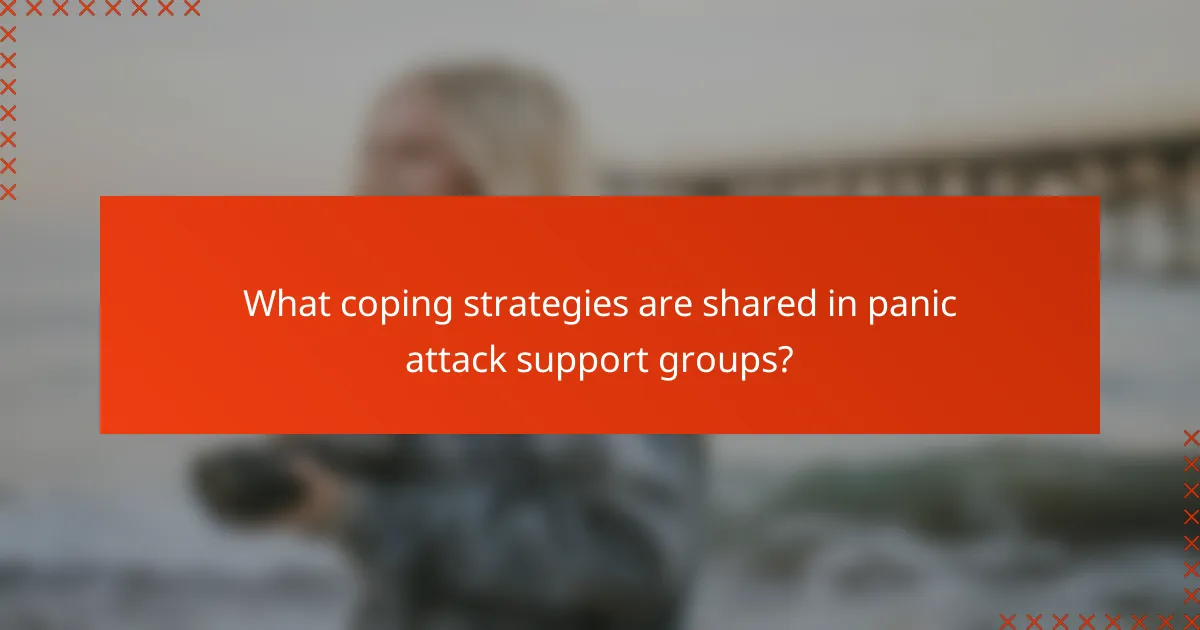
What coping strategies are shared in panic attack support groups?
Panic attack support groups often share effective coping strategies that help individuals manage their symptoms. These strategies focus on practical techniques that can be used during an attack or in daily life to reduce anxiety and promote calmness.
Breathing techniques
Breathing techniques are fundamental in managing panic attacks. They help regulate your body’s response to anxiety by promoting relaxation. One common method is the 4-7-8 technique: inhale for 4 seconds, hold for 7 seconds, and exhale for 8 seconds.
Practicing these techniques regularly can enhance their effectiveness during a panic attack. Aim to spend a few minutes each day focusing on your breath, which can help create a sense of control when anxiety arises.
Mindfulness practices
Mindfulness practices encourage individuals to stay present and aware, reducing the overwhelming feelings that can accompany panic attacks. Techniques such as meditation or mindful observation can help ground your thoughts and emotions.
In support groups, members often share their experiences with apps or guided sessions that facilitate mindfulness. Starting with just a few minutes each day can significantly improve your ability to cope with anxiety over time.
Grounding exercises
Grounding exercises are designed to reconnect you with the present moment, helping to alleviate feelings of panic. Techniques may include focusing on your surroundings, such as naming five things you can see, four things you can touch, three things you can hear, two things you can smell, and one thing you can taste.
These exercises can be particularly effective during a panic attack, as they redirect your focus away from distressing thoughts. Practicing grounding techniques regularly can enhance your resilience against future anxiety episodes.
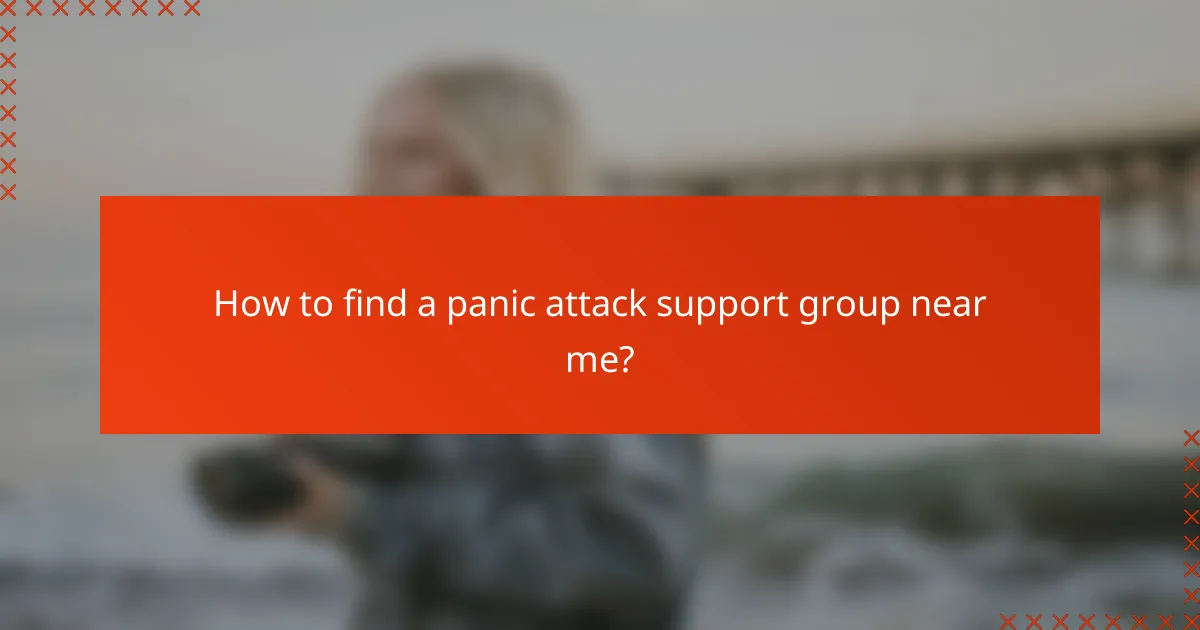
How to find a panic attack support group near me?
To find a panic attack support group nearby, start by searching online directories, local mental health services, and social media platforms. These resources can connect you with groups that offer community support, shared experiences, and coping strategies tailored to your needs.
Online directories and resources
Online directories are a valuable starting point for locating panic attack support groups. Websites like Psychology Today and Mental Health America allow you to filter results based on your location and specific needs. You can often find both in-person and virtual options listed.
Additionally, platforms like Meetup can help you discover local gatherings focused on anxiety and panic attacks. Look for groups that emphasize shared experiences and coping strategies, as these can provide a supportive environment.
Local mental health services
Your local mental health services can be a crucial resource for finding support groups. Many hospitals and clinics offer group therapy sessions or can refer you to community organizations that specialize in anxiety disorders. Contacting them directly can yield personalized recommendations.
Consider checking with community centers or non-profit organizations that focus on mental health. They often host support groups and can provide information on meeting times and locations.
Social media community groups
Social media platforms host numerous community groups dedicated to panic attacks and anxiety support. Facebook, for example, has various private groups where members share their experiences and coping strategies. Joining these groups can provide immediate access to a supportive network.
When participating in social media groups, ensure that they maintain a positive and constructive atmosphere. Look for groups with active moderation to foster a safe space for sharing and learning from others.
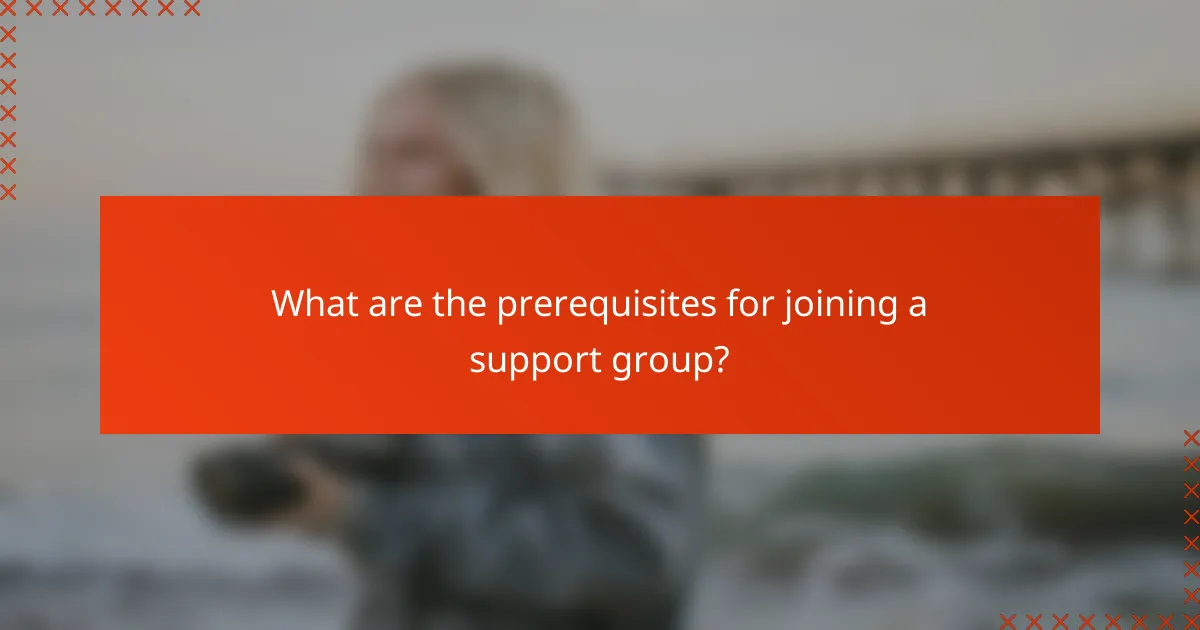
What are the prerequisites for joining a support group?
Joining a support group for panic attacks typically requires no formal prerequisites. Most groups welcome individuals seeking community support, shared experiences, and coping strategies, regardless of their background or diagnosis.
No formal diagnosis required
Many support groups do not require participants to have a formal diagnosis of panic disorder or any other anxiety-related condition. This openness allows individuals who experience panic attacks or anxiety symptoms to seek help and connect with others facing similar challenges.
When considering joining a group, focus on your willingness to share experiences and learn from others. Some groups may ask about your experiences with panic attacks to better tailor discussions, but a diagnosis is generally not necessary.
Open to all ages
Support groups for panic attacks are typically inclusive and open to individuals of all ages. Whether you are a teenager experiencing anxiety for the first time or an adult seeking support, these groups aim to create a welcoming environment for everyone.
Age diversity can enrich discussions, as participants bring different perspectives and coping strategies. When looking for a group, consider those that specifically mention inclusivity to ensure a comfortable atmosphere for sharing and learning.
